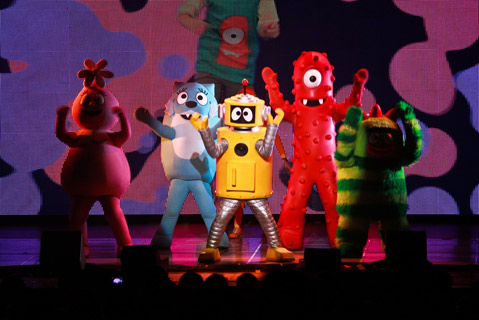Yo Gabba Gabba! at Arlington Theatre on March 4
Puppets, Animation, and a Treatise on Liminality

In 1909, the anthropologist Arnold van Gennep introduced his theory of liminality, or “the transition from one state to another” in ritual practices, such as coming-of-age ceremonies when boys are initiated into manhood. The liminal phase is an in-between space, when one’s being defies the named classifications of one’s culture, when one is no longer one thing but not yet another. Scholars since van Gennep have outlined the concept of liminality to refer to any borderline that unfolds into a territory of its own, whether it be the border between life and death, human and animal, animate and inanimate, or reality and fantasy. It is obvious that we are entering into such a territory at the very start of Yo Gabba Gabba! Get the Sillies Out! — performed live at the Arlington Theater Friday night — when a shotgun blast of confetti breaks through the border between audience and stage.
When DJ Lance Rock — the deity-like drum major who sets the rhythm to which the inhabitants of a surreal world called Gabba Land march — materializes on a digital screen and then jumps onto the stage proper, our time-space schema is further disoriented. Gabba Land is not a world of absolutes but a world of what-ifs where humans interact with digital animations and imaginary live-action creatures. The five Gabbas themselves are examples of liminality; they’re each a combination of animal, machine, human, and plant. Take, for instance, the sweet girl next door Foofa, who looks like a pink turnip with a flower growing out of her head, or Plex, “the magic robot” who, despite his mechanical appearance, acts as a father to the other four.
The category-scrambling nature of the Gabbas represents the early developmental stages of the toddlers they are meant to entertain wherein the right hemisphere of the brain rules the day. Such young children cannot yet make sense of their feelings nor fluently express them in language. The Gabbas thus help their audience to navigate the no-man’s-land of toddler existence.
Sure, one could write off the live-action Yo Gabba Gabba! performance as a dance party for kids (as if the carnival itself were not a symbolically rich ritual ceremony), but that would mean ignoring the more brooding elements of the performance. For instance, there is the heart-stopping tension when the Toodee — the blue, feline Gabba — deposits herself behind a rock formation during a game of hide-and-seek and the others can’t find her despite diligent and prolonged searching. This scene speaks to the fragility of our relationships. Or, when Muno — the Gabba that resembles a pencil eraser with a single giant eyeball — shares his fear of the dark, it is an outward expression of the incessant inner ululation of existential dread.
It is only in relief of such scenes that we can begin to appreciate dance numbers like “Jump,” featuring saxophonist and UCSB alumnus Mike Parker or the beat-boxing hip-hop stylings of guest performer Biz Markie. It must be noted that the most rousing performance was led by Brobee — the furry, green, elbowless Gabba — who erupted onto the stage after intermission to sing a bass-thumping version of “Party in My Tummy.” Anyone who could resist dancing at that point in the show simply must have been a Vulcan.
Still, it was the final — and title — number, “Get the Sillies Out!,” that most strongly implied the conclusion this reviewer has been trying to get across. The “sillies” represent the emotions imprisoned in the incomplete limbic system of a young mind, and the Gabbas provide a bridge to expression. Like the portable music device from whence they emerge, they deliver the message that what cannot always be said in words can be communicated via artistic expression. And they say it. Friday night, the Arlington provided the backdrop for a collective ritual of sorts, with the theater becoming the setting of a mystical pint-sized walkabout. And by the end of the performance, yes, the sillies had been gotten out.



